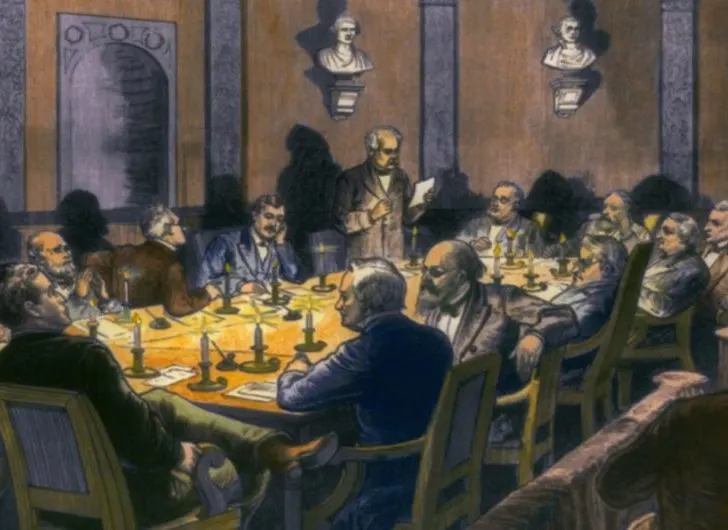A “smoke-filled room” is used to describe a situation where politicians or other powerful individuals gather in a private, enclosed space to make important decisions or negotiations without public scrutiny.
Origin of “Smoke-Filled Room”
The term originated in the early 20th century, when smoking was still a common practice in public spaces and it was not uncommon for politicians to gather in rooms filled with cigar smoke to discuss and make decisions about important issues.
The Encyclopedia of Chicago notes the original smoke-filled room was in Chicago’s Blackstone Hotel, where:
A small group of powerful United States senators gathered to arrange the nomination of Warren G. Harding as Republican candidate for president in 1920… when the Associated Press reported that Harding had been chosen “in a smoke-filled room,” the phrase entered the American political lexicon.
Ever since, “smoke-filled room” has meant a place, behind the scenes, where cigar-smoking party bosses intrigue to choose candidates.
In a political context, the term “smoke-filled room” is often used to refer to a situation where a small group of influential individuals — often part of a political machine — are able to make important decisions without input or oversight from the general public.

This can be seen as a form of political corruption or elitism, as the decisions made in these private gatherings are not subject to the same level of transparency and accountability as decisions made in more public forums.
For example, a “smoke-filled room” might refer to a situation where party leaders gather in private to decide on a candidate for an election, without input from rank-and-file members of the party.
In this case, the party leaders are able to make the decision without the need to consult with the broader party membership, which can lead to accusations of undemocratic or elitist decision-making.
The use of “smoke-filled rooms” can also be seen as a way for politicians to avoid public scrutiny and accountability for their actions.
By making decisions behind closed doors, politicians can avoid having to justify their decisions to the public or answer difficult questions from the media.
This can be particularly problematic when decisions made in these private gatherings have significant consequences for the general public.
In addition to its use in a political context, the term “smoke-filled room” can also be used more generally to refer to any situation where a small group of individuals are able to make important decisions without input or oversight from others.
For example, it could be used to describe a situation where a group of executives are able to make important decisions about a company without consulting with the broader workforce.
Use of “Smoke-Filled Room” in a sentence
- Critics of the political process often use the term ‘smoke-filled room’ to refer to the perceived backroom deals and secretive negotiations that take place among party leaders.
- The smoke-filled room has become a symbol of the elitism and insider dealing that many believe is prevalent in politics.
- In response to concerns about the influence of the smoke-filled room, many political parties have adopted more transparent and inclusive decision-making processes.